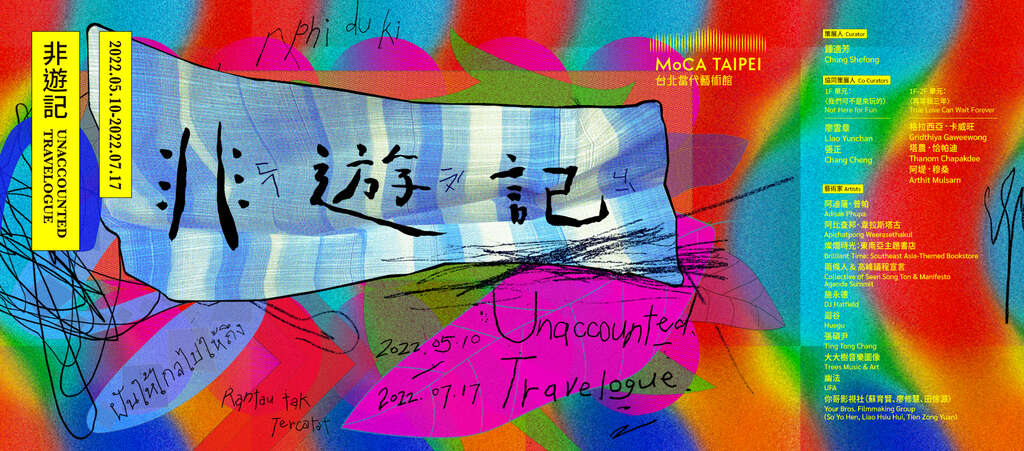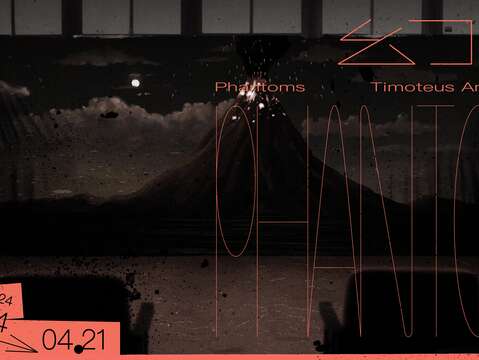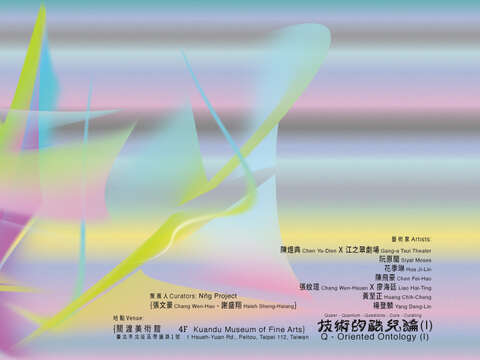Post date:2022-05-26
Updates:2022-05-26
874

- Event Time
- 2022-05-10~2022-07-1710:00 - 18:00(Closed on Mon.)
- Event Location
- NO.39,Chang-An West Road., Datong Dist., Taipei City Taiwan, R.O.C
I Shall Sing for You: Unofficial Travel between Taiwan and Thailand in Unaccounted Travelogue
By Chung Shefong
Unaccounted Travelogue does not belong to the lyrical genre of travel literature, nor does it include romantic scenes of leisure excursions. Instead, through two interweaving and inter-successive tracks, the exhibition gathers faint and unheard voices at the periphery which have been long drown out by mainstream narratives.
The first track, titled Not Here For Fun, comprises first-person accounts by Southeast Asian migrants, who express their opinions as laborers, struggles for livelihood, feelings and emotions, as well as observations of the Taiwan society through writings, letters, artistic creations, exhibitions, and performances.
The exhibition is constituted of three gallery rooms, each showing the documentation of migrants’ life in great abundance. These include letters and drawings from the contributors of Southeast Asian migrant workers; laboring scenes and thoughts of migrant workers in the singing show, “Singing in Taiwan”; migrants’ writings from the “Literature Award for Migrants” about moments of their life and their scarce leisure hours apart from the relentless cycle of labor; and cultural initiatives that encourage and advocate migrants’ right to read, i.e., “Brilliant Time: Southeast Asia-Themed Bookstore” and “The Library on the Floor,” the latter of which takes place in the Taipei Main Station lobby.
Through the representation of manuscripts and documents, laboring life, and reading spaces, the exhibition epitomizes the chronicle of labor composed by Southeast Asian migrants in Taiwan over the course of past three decades, which enable the audience to re-perceive Taiwan through the migrants’ eyes as well.
The second track, True Love Can Wait Forever, consisted of resonances between labor songs and social politics. Using northeastern Thai folk music known as “Molam” and Taiwanese indigenous “Linban songs” (literally, “songs of forest compartments”), the exhibition unveils narratives woven with labor migration and the politics of songs.
Eleven artists/art groups from Taiwan and Thailand illustrate a unique period in time through songs and music, and employs historical archives, records and recordings, representation of space, as well as soundscape and video installation to portray labor forms and lifestyle of minority communities informed by policies of national development. Against a historical background shared by Taiwan and Thailand, the Molam music and Linban songs expose how songs have been used for political mobilization amidst ideological confrontations during the Cold War period, while documenting laborers’ struggle for survival in urban peripheries, as well as the loss of roots and voices throughout the process of constructing national identity.
The forestry labor force of “linban” (compartment teams) formed by Taiwanese indigenous people since the period of Japanese period shaped the archetype of indigenous people’s contemporary labor songs, which is known as “Linban songs”. The collective laboring lifestyle that brought indigenous laborers from one village to another infused the characteristics of hybridized melodies and languages, together with an element of improvisation, into this genre of singing music. Consequently, their labor songs have served as a form of sketch that documents Taiwanese indigenous people’s endless “wandering” and their self-image refracted by the mainstream society against a backdrop informed by socio-political vicissitudes. Folk songs with its documentary function are also a type of archives, which record the history of indigenous rights movements as well as their ongoing fight for the land since the 1980s.
From 1994 to 2000, the annual number of Thai migrants in Taiwan’s industrial sector exceeded hundreds of thousands of people. Among all Thai migrants in Taiwan, those from Isan in northeastern Thailand made up the largest part. Due to the infertile soil and uneven rainfall in the region of Khorat Plateau in northeastern Thailand, plus an imbalance of regional developments, there existed a great regional economic disparity between the northeastern part of Thailand and the rest of the country. In the 1960s, poverty forced the Isan people to start migrating to large cities in Thailand or overseas, where they were able to find manual works with low wages. Contemporary Molam songs have recorded the diasporic experiences and homesickness of the Isan people over the decades, along with their identity as a marginal community as “the northeastern people” and their politico-cultural separation from Bangkok, the center of power in the country.
Language is the dwelling place for those on the journey of wandering, and songs are the nourishments for sustaining life and vitality. The singing of Linban songs and Molam songs is interlaced with the diasporic stories of the rootless, who travel in the world to make a living. Under the scorching sun and on scaffolding, laborers pass nails and hammers from one to another while continuing the same fate. Facing the inexhaustible mental and physical fatigue, long separations and seemingly longer waits, the only obtainable form of freedom is the singing of Molam songs and Linban songs in A minor chord that express one’s inner feelings in mother tongue.
By Chung Shefong
Unaccounted Travelogue does not belong to the lyrical genre of travel literature, nor does it include romantic scenes of leisure excursions. Instead, through two interweaving and inter-successive tracks, the exhibition gathers faint and unheard voices at the periphery which have been long drown out by mainstream narratives.
The first track, titled Not Here For Fun, comprises first-person accounts by Southeast Asian migrants, who express their opinions as laborers, struggles for livelihood, feelings and emotions, as well as observations of the Taiwan society through writings, letters, artistic creations, exhibitions, and performances.
The exhibition is constituted of three gallery rooms, each showing the documentation of migrants’ life in great abundance. These include letters and drawings from the contributors of Southeast Asian migrant workers; laboring scenes and thoughts of migrant workers in the singing show, “Singing in Taiwan”; migrants’ writings from the “Literature Award for Migrants” about moments of their life and their scarce leisure hours apart from the relentless cycle of labor; and cultural initiatives that encourage and advocate migrants’ right to read, i.e., “Brilliant Time: Southeast Asia-Themed Bookstore” and “The Library on the Floor,” the latter of which takes place in the Taipei Main Station lobby.
Through the representation of manuscripts and documents, laboring life, and reading spaces, the exhibition epitomizes the chronicle of labor composed by Southeast Asian migrants in Taiwan over the course of past three decades, which enable the audience to re-perceive Taiwan through the migrants’ eyes as well.
The second track, True Love Can Wait Forever, consisted of resonances between labor songs and social politics. Using northeastern Thai folk music known as “Molam” and Taiwanese indigenous “Linban songs” (literally, “songs of forest compartments”), the exhibition unveils narratives woven with labor migration and the politics of songs.
Eleven artists/art groups from Taiwan and Thailand illustrate a unique period in time through songs and music, and employs historical archives, records and recordings, representation of space, as well as soundscape and video installation to portray labor forms and lifestyle of minority communities informed by policies of national development. Against a historical background shared by Taiwan and Thailand, the Molam music and Linban songs expose how songs have been used for political mobilization amidst ideological confrontations during the Cold War period, while documenting laborers’ struggle for survival in urban peripheries, as well as the loss of roots and voices throughout the process of constructing national identity.
The forestry labor force of “linban” (compartment teams) formed by Taiwanese indigenous people since the period of Japanese period shaped the archetype of indigenous people’s contemporary labor songs, which is known as “Linban songs”. The collective laboring lifestyle that brought indigenous laborers from one village to another infused the characteristics of hybridized melodies and languages, together with an element of improvisation, into this genre of singing music. Consequently, their labor songs have served as a form of sketch that documents Taiwanese indigenous people’s endless “wandering” and their self-image refracted by the mainstream society against a backdrop informed by socio-political vicissitudes. Folk songs with its documentary function are also a type of archives, which record the history of indigenous rights movements as well as their ongoing fight for the land since the 1980s.
From 1994 to 2000, the annual number of Thai migrants in Taiwan’s industrial sector exceeded hundreds of thousands of people. Among all Thai migrants in Taiwan, those from Isan in northeastern Thailand made up the largest part. Due to the infertile soil and uneven rainfall in the region of Khorat Plateau in northeastern Thailand, plus an imbalance of regional developments, there existed a great regional economic disparity between the northeastern part of Thailand and the rest of the country. In the 1960s, poverty forced the Isan people to start migrating to large cities in Thailand or overseas, where they were able to find manual works with low wages. Contemporary Molam songs have recorded the diasporic experiences and homesickness of the Isan people over the decades, along with their identity as a marginal community as “the northeastern people” and their politico-cultural separation from Bangkok, the center of power in the country.
Language is the dwelling place for those on the journey of wandering, and songs are the nourishments for sustaining life and vitality. The singing of Linban songs and Molam songs is interlaced with the diasporic stories of the rootless, who travel in the world to make a living. Under the scorching sun and on scaffolding, laborers pass nails and hammers from one to another while continuing the same fate. Facing the inexhaustible mental and physical fatigue, long separations and seemingly longer waits, the only obtainable form of freedom is the singing of Molam songs and Linban songs in A minor chord that express one’s inner feelings in mother tongue.
 Unaccounted Travelogue
Unaccounted Travelogue








